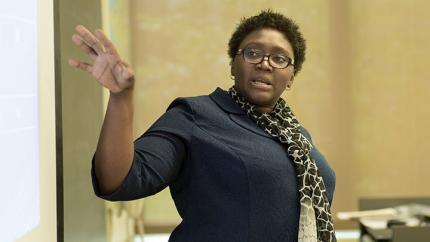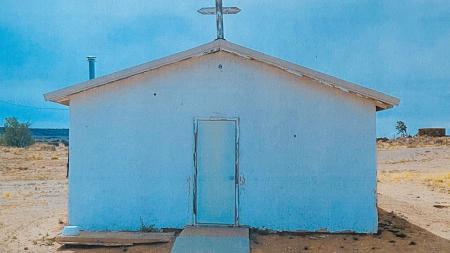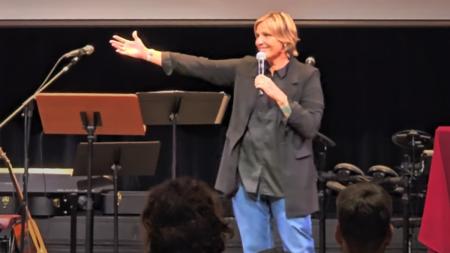Calvin Institute of Christian Worship Expands Its Vital Worship Program

Nursing professor Adejoke Ayoola was among nine Calvin College faculty members who shared scholarly insights with attendees at the "Taking Your Church to College" event in June 2016.
Calvin College
How can we revitalize Christian worship across congregational, denominational, racial, educational, and generational lines?
Seeking to answer this question, the Calvin Institute of Christian Worship (CICW) operates the Vital Worship Grants Program, which annually provides grants of $6,000 to $18,000 to a range of organizations for the implementation of projects aimed at improving worship.
Earlier this summer, CICW held an evening gathering featuring a poster session showcasing the 2017 grant recipients’ projects, held to both inform the 2018 grant recipients’ project planning and to encourage others to apply in the future.
It was part of a three-day colloquium that represented the end of the previous year’s grant projects and kicked off the 2018 grant recipients’ projects.
Meanwhile, CICW recently announced it is starting a second stream of grants: the Teacher-Scholars program, which seeks to foster vital worship by supporting teacher-scholars in any field as they do integrated research that connects worship with other disciplines of study and practice. The goal is to advance the flourishing of Christian public worship practices in worshiping communities.
"At Calvin College, we believe that our teaching, research, and collaborative learning are not ends in themselves but serve a larger redemptive purpose in God's world,” said John Witvliet, director of the Calvin Institute of Christian Worship.
Formational worship across borders
The gathering in June highlighted churches, organizations, and ministries that received Vital Worship grants, which have the goal of revitalizing everybody’s public worship so that it may “become more formational for the people there, and more honoring of the triune God who’s present in worship,” said Kathy Smith, associate director of the institute and program manager for the grant program,
To that end, Smith said, “the [program] is very ecumenical,” with more than 20 denominations represented among the 2017 grant recipients.
Diverse expressions of faith
At the poster presentation, there was dramatic diversity in both institutions and grant projects: churches, seminaries, universities, high schools, nonprofits, retreat centers, and a prison ministry were all represented.
Projects ranged from Fredericktown United Methodist’s work on making worship accessible to people with disabilities to Carey Theological College’s work of strengthening intergenerational worship in multilingual Chinese-Canadian churches.
“The beauty of our worship is dependent on our liturgical artistry,” said Christine Salzman, a presenter for Saint Philothea Greek Orthodox church of Watkinsville, Georgia. She noted the intergenerational problems facing Orthodox worship in the United States, adding that “young people need to take up their place at the chanter’s stand.”
To address this issue, Saint Philothea used their grant to operate a liturgical arts training program with workshops on chanting and iconography for both their congregation and other American Orthodox churches.
Mount Aery Baptist Church of Bridgeport, Conn. , used their grant to train clergy how to respond to trauma from a biblical perspective.
“Through the [grant project’s training], preachers better understand how God is still in control,” said Nancy Kingwood, an associate pastor at Mount Aery. She added that the training was intended to help answer “H ow do we respond when God moves through us?”
Building on a firm foundation
The new stream of grants came in part out of “Taking Your Church to College: Strengthening Congregational Life through Liberal Arts-Style Learning,” a learning event held on Calvin College’s campus in 2016. Now, in 2018, CICW is opening up new doors for the college in the church with its Teacher-Scholar grants, which are part of the Vital Worship Grants Program.
Leaders say the addition of this new stream of grants will help CICW lean more fully into its mission of both promoting the scholarly study of worship and contributing to the renewal of worship in North American congregations.
“At CICW, our mission is to promote the renewal of worship through our learning together over time. The insights of teacher-scholars in many fields can be a source of profound wisdom for congregations,” said Witvliet.
Listening to many voices
And much like the worshiping communities stream of grants, the new Teacher-Scholar grants will glean profound wisdom from a wide range of voices—scholars in any field who teach at an accredited seminary, divinity school, college, or university that is a non-profit organization in North America.
"We are deeply hopeful that this program will continue to extend our ecumenical and cross-cultural engagement, helping us learn from and with Christians in many traditions and in many cultural contexts,” said Witvliet. “We all need each other in the body of Christ."
Application for the first round of grants runs through October 1, 2018. Up to 30 grant recipients will be notified of their selection in early December 2018, and the cohort will officially kick off their one-year grant cycle at the Vital Worship Grants annual event in June 2019.
There they will be able to interact with leaders in the worshiping communities who are beginning and/or completing their grant cycle. They will then present their scholarly research a year later in June 2020. Leaders expect these interactions will spark imagination and learning.
Since its founding in 2000, the Vital Grants Program, made possible through the support of Lilly Endowment Inc., has supported more than 800 year-long projects for leaders in worshiping communities across North America.


